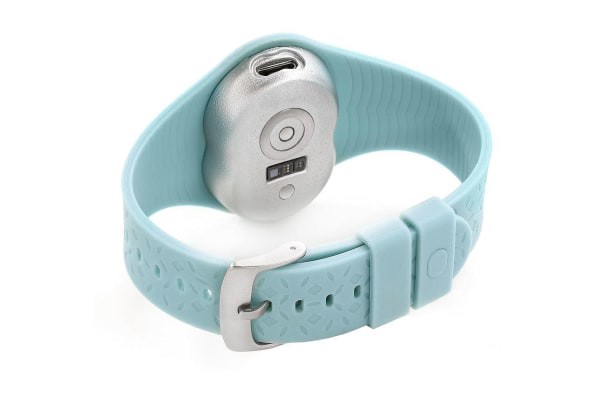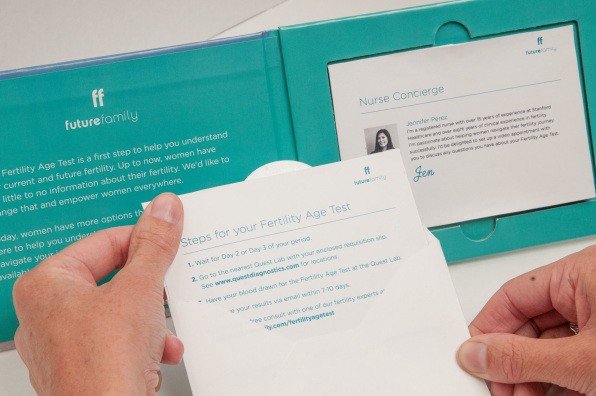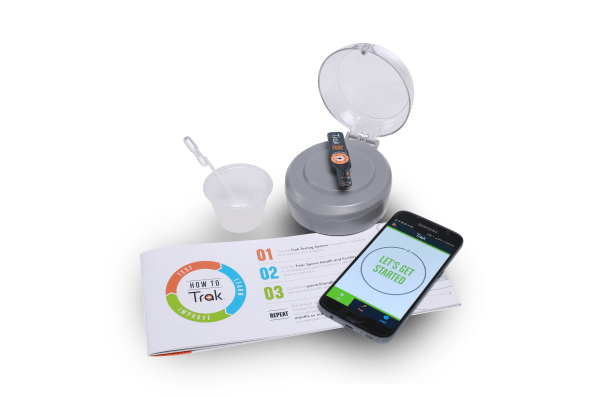Can Silicon Valley Get You Pregnant?
With ovulation trackers and sperm tests, startups are filling in the gaps for accessible fertility care. Is it a new era for women’s healthcare funding?

BY RINA RAPHAEL
A little over two years ago, Tammy Sun, 36, decided she wanted to freeze her eggs. The problem? Her then employer Evernote didn’t cover the procedure.
“We had these awesome benefits around everything from food to transportation to healthcare, but there was nothing for this,” Sun recalls of spending over $30,000 of her own money on egg freezing, a procedure that has tripled in popularity in the last five years. “There was such a mismatch between what I consider healthcare and what the system considered healthcare.”
Meanwhile, tech stalwarts such as Facebook and Apple offered such benefits, solidifying the idea that fertility care was a luxury reserved for top-tier companies. The disparity inspired a frustrated Sun to launch Carrot Fertility, which works closely with employers to offer affordable and customizable fertility care benefit programs that include IVF, surgery, and egg freezing.
Since its 2016 founding, the San Francisco-based startup raised $3.5 million in funding and now works with dozens of employers, ranging from small finance and legal firms in the Midwest to Silicon Valley giants like Foursquare.
“There’s a huge part of the the economy in the middle market where these types of benefits should be available,” stresses Sun. “It should be considered a basic part of healthcare.”
“THIS IS SOMETHING THAT MATTERS TO A LOT OF PEOPLE.”
Carrot Fertility is just one of dozens of fertility startups that emerged in the last few years as female founders draw greater attention to the issue. As, for the first time, the majority of new moms in the U.S. are over 30, medical intervention becomes a more pressing reality for couples. The CDC’s National Survey of Family Growth found that over 7 million women (that’s 12% of American women of reproductive age) have sought fertility treatment services.
That means an influx of startups dedicated to a host of issues surrounding the complexity that involves starting a family: ovulation tracking, ovarian reserve testing, programs to make the process more accessible, and more. As such, the global fertility services market is expected to grow to $21 billion by 2020, with an annual growth rate of almost 9%, according to a Technavio research report.
As Sun stresses, “It has become evident to the world that this is something that matters to lot of people.”
Ava bracelet

THE MONITORING MARKET
Unity Stoakes, president and cofounder of StartUp Health, a global health innovation company with a portfolio of over 200 digital health companies, pinpoints the start of the fertility revolution to a bold-faced name: Max Levchin. In 2013, the PayPal cofounder helped launch Glow, a female fertility tracking app dubbed “Fitbit for your period.” The move attracted high-profile attention and garnered widespread press.
Since then, following numerous new studies as well as outspoken celebrities (such as Chrissy Teigen and Kim Kardashian) on the topic, Stoakes says he’s seen a significant increase in the sector as more investors recognize how great the need is. A large portion of these startups focus on trackers and at-home tests to manage one’s reproductive opportunities with ease and comfort.
“Being able to manage and learn about your health issues in the privacy of your own home becomes very important,” he says, “and then to be able to hopefully take action or do something about it.”
Ava is one such company. It makes detecting a woman’s fertile window a more seamless process by way of a $249 cycle-tracking sensor bracelet. The medical technology startup collects data on nine different physiological parameters, including breathing, sleep, temperature, pulse rate, heat loss, and heart rate.
One could technically check all these issues by themselves, but as Ava cofounder and president Lea von Bidder explains, taking count of all factors every single day at the same exact time “is really inconvenient . . . and not very romantic.”
The bracelet also promises more information with a higher sense of accuracy and security.
“It’s not just ‘Okay, you’re fertile’ or ‘You are not fertile,” says von Bidder. “You really start to understand [the process].” In that sense, Ava is more than just a helpful accessory; it’s also an ecosystem for women who want to understand their body better. The Ava site and app offers expansive research on women’s fertility issues as well as a community support system.

Likewise, the Trak male fertility test lets men discover more about their own reproductive health. Launched in 2017 by Sandstone Diagnostics, the $199 kit and app measures, tracks, and analyzes sperm count. One’s sperm is a unique health parameter that often fluctuates based on lifestyle habits, for which Tracks suggests modifications.
Sandstone Diagnostics CEO Karen Drexler says the company’s goal is to ensure that when people discuss reproductive health, it includes both genders. While women tend to be the drivers when it comes to starting a family, clinical research and data show that men contribute to half of all infertility cases, yet often don’t get involved in the process until much later. A recent study by the Hebrew University of Jerusalem found that sperm counts among Western men declined by 52% in the past 40 years and are currently falling by an average of 1.4% a year.
The discreet kit also helps men deal with awkwardness and embarrassment associated with testing. This is a demographic, says Dr. Greg Sommer, chief scientific officer of Sandstone Diagnostics, that doesn’t visit a doctor unless they blow out a knee playing basketball.
“Having a very accessible, convenient, cost-effective home option to get over that initial barrier goes a long way,” says Sommer. “We’re trying to put the man front and center, right there right next to her from day one, saying this is not a his or her problem; this is a his and hers pursuit.”
Dr. Hal Danzer, cofounder and partner of the Southern California Reproductive Center, is a supporter of these new kits and trackers. This includes ovarian reserve tests that evaluate AMH, the hormone secreted from ovarian follicles. He sees fertility startups offering many of the exact same tests that fertility offices offer, thereby giving couples a headstart.
“If [a woman’s] AMH is low in the beginning, then you save six months of wasted time and energy, and if you’re 40, those six months can be a big difference,” Hanzer explains.
At the same time, at-home care is not without drawbacks or criticism. These tests often don’t account for women with irregular cycles or analyze the condition of eggs, both of which affect results. They can also be unreliable: In January, 37 women who relied on a European fertility app called Natural Cycles as their contraception method reported unwanted pregnancies.
Danzer says apps generally offer more reward than risks when it comes to conceiving, especially in ways of education and health coaching, but he does admit that they often cannot fully compete with a doctor’s office: “From genetic screening to prenatal blood to rubella, there are pluses to being seen for prenatal testing by their gynecologist.”
LOWERING PRICEY BARRIERS
“This is one of the largest out-of-pocket health variances that millennials face right now,” says Claire Tomkins, cofounder of Future Family, a startup that guides women through the fertility journey. “It really is a bit of an unaddressed healthcare crisis.”
A CDC survey found that 29% of women with fertility issues sought medical advice, and 27% had some variant of medical testing, though only 3% had assisted reproductive technology. That may be due to the high cost. The average price for a round of IVF usually hovers at around $12,400, but individuals often go through several rounds. The journal Fertility and Sterility estimates the cost of a successful IVF to be closer to $61,000.

Future Family addresses this barrier to entry via a monthly payment subscription service for fertility care, which includes testing, medical expertise, a “nurse concierge” to handle medical appointments, and IVF or egg-freezing treatments. It also provides fertility testing via a lab at 40% less cost than those done at a traditional private clinic.
“As we’ve seen across the technology landscape, millennials want to buy services,” says Tomkins, who previously served as an executive at SolarCity. “They’re not interested in expensive upfront products, whether it’s a mattress or a car, or in this case, a healthcare service.”
In 2016, Carrot Fertility conducted a nationwide survey that found 67% of respondents (both male and female) believed they couldn’t access fertility care because it was too expensive. They also, however, found that 62% of millennial women said that they would strongly opt for an employer that offers fertility benefits.
In fact, says Sun, a high percentage of new clients are coordinated by employees who bring Carrot Fertility’s attention to HR directors.
“Companies are becoming more interested in [fertility benefits] because their employees are asking for it,” says Sun, who sees it becoming more important during the recruiting process. “There is really a bottom-up approach to this.”
But some industry experts foresee issues of widespread adoption. Halle Tecco, investor and founder emeritus of Rock Health, a seed fund investing in digital health startups, thinks the majority of employers still grapple with what they consider a specialty service. If companies have the option of pursuing a generic platform versus, say, Maven, a digital clinic for women, they will likely choose the one that encompasses both genders.
“It’s a little bit harder of a channel to break into,” says Tecco. “When you’re expecting an employer to buy something on behalf of their employees, will they do it if it’s not going to benefit all of their employees?”
SCRATCHING THE STARTUP SURFACE
Future Family’s executive team sees growing investor interest in fertility startups as more women join the digital health sector. “What we’ve found is everyone has someone who has a [fertility] experience,” Claire Tomkins says. “We’re just seeing that demographic shift.”
According to a CB Insights report, the women’s healthcare startup sector raised over $1.1 billion in the last three years. A large percentage went to fertility platforms, such as fertility employer benefits company Progyny ($62 in funding) and Prelude ($200 million), which helps women with egg freezing and fertility treatments.
StartupHealth’s Unity Stoakes credits a portion of the boom to what he calls “doctor-preneurs,” i.e., a wave of female physicians who have now ventured in digital health. Over 30% of StartupHealth’s portfolio is run by women, many of them holding MDs and PhDs.
“There are more women’s health startups now, but there’s still not enough,” says Stoakes, pointing to the fact that 17% of tech companies are founded by women.
Tecco says this to often due to the fact that male investors can’t necessarily relate to female issues. TechCrunch found that only 7% of partners at top 100 venture firms are women.
“I’ve heard the same story over and over of male investors who did not really understand the problem well enough to get excited about a company,” says Tecco. “And the few women and doctors that there are [in this sector] are spread so thin because they’re overwhelmed with the amount of opportunity.”
But the tide is gradually turning. Sun recounts “very little enthusiasm and understanding of the problem” when she first began her work on Carrot Fertility. “In the past 18 months, it has changed so fast.”
A recent study by Rock Health found that 39% of U.S.-based women’s health digital health companies–led by women– received $2 million-plus of venture funding since 2011. Tecco predicts more fertility companies will increase, though concedes it’s partially because the overall digital health care is growing, and that “women’s health is an area that has been traditionally neglected comparatively, so there has been some catching up.”
And there are still plenty of opportunities for these startups to pursue. All the companies referenced in this piece spoke of launching future lines of products or expanding their expertise in various subsectors. Ava, for example, is currently working on a research study in conjunction with the University Hospital of Zurich to better understand irregular menstrual cycles, and how the startup can serve women with the condition.
“We need more clinical research,” stresses von Bidder. “There are a lot of claims without much backing, and I think that’s that’s homework for all the companies that are in this space. We need to work closely with medical providers and have solutions that really work for women because we have huge potential with technology.”

Trak, meanwhile, will partner with various companies on the women’s health side, in part because of the amount of data they’re collecting on men’s sperm counts and health-lifestyle habits. (“We’ve just started to scratch the surface of what we can do with that data,” says Drexler.) Trak sales have grown greater than 60% quarter over quarter in the last year, and recently climbed to the №1 best-selling fertility device on Amazon.com.
Future Family intends to introduce a suite of products for men, as well as improve on the current features of their fertility tests. “There is growing awareness now in the market,” says Tomkins.
Despite rapid growth, says Stoakes, it’s an underserved market, both in the U.S. and globally. “It’s actually surprising that it’s taken so long, considering how big the market opportunity is and how great the need is,” he says. “It’s why we’re advocating for more entrepreneurs to be focused on this sector–it’s still wide open.”
Hi! I am a robot. I just upvoted you! I found similar content that readers might be interested in:
https://www.fastcompany.com/40521525/fertility-tech-is-worth-billions-and-investors-are-finally-paying-attention